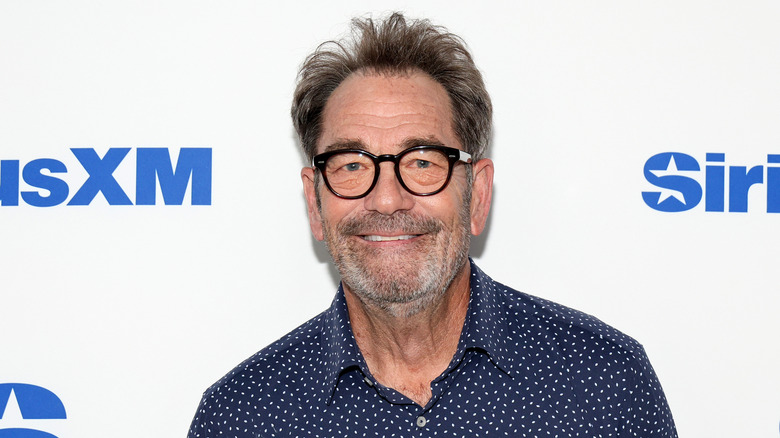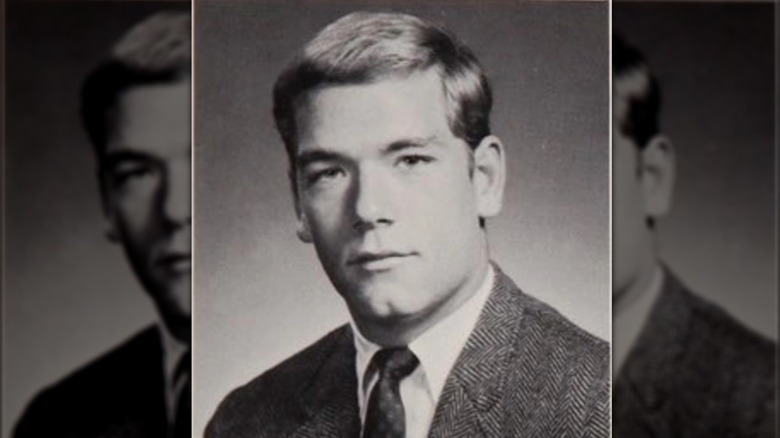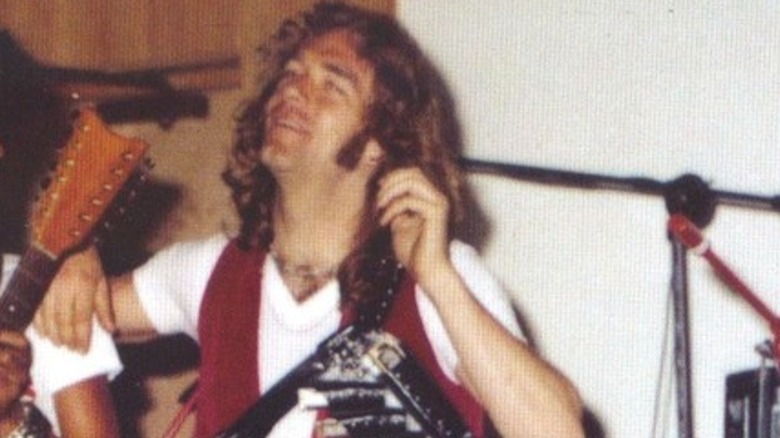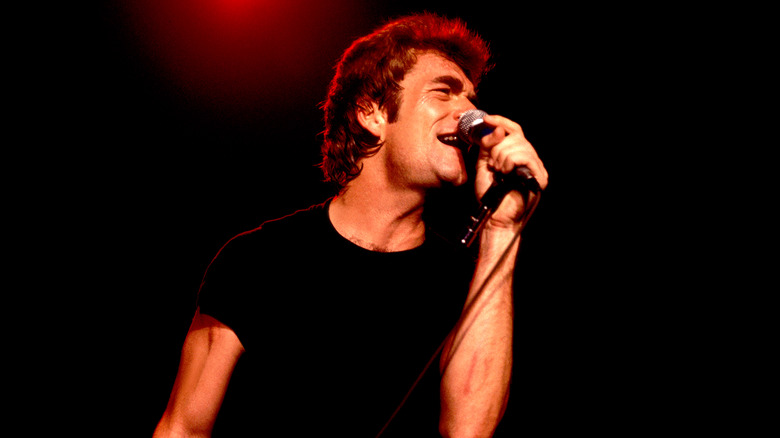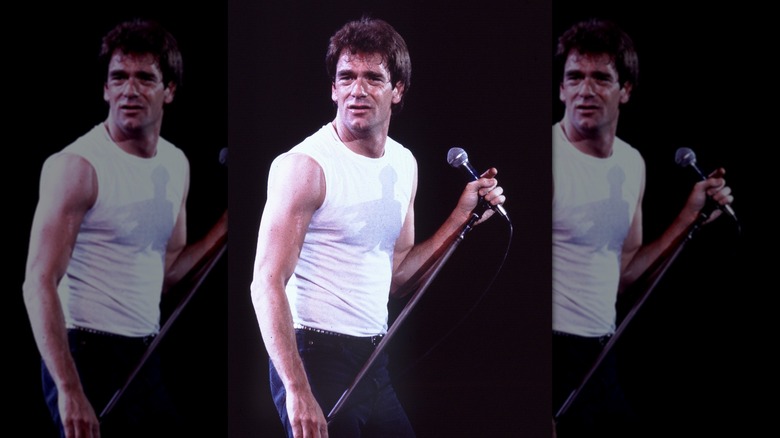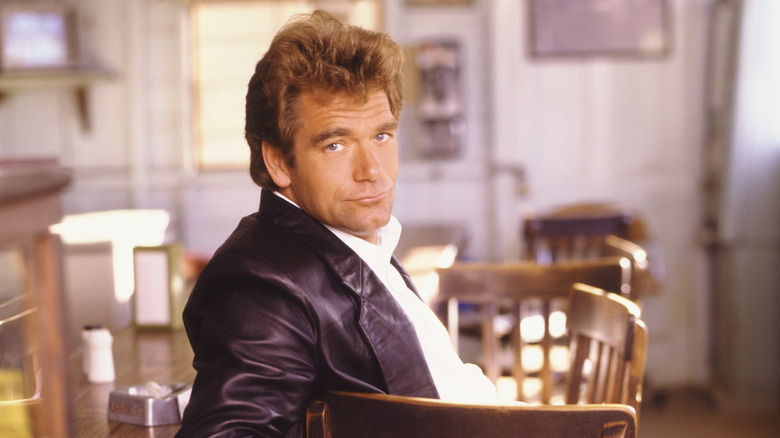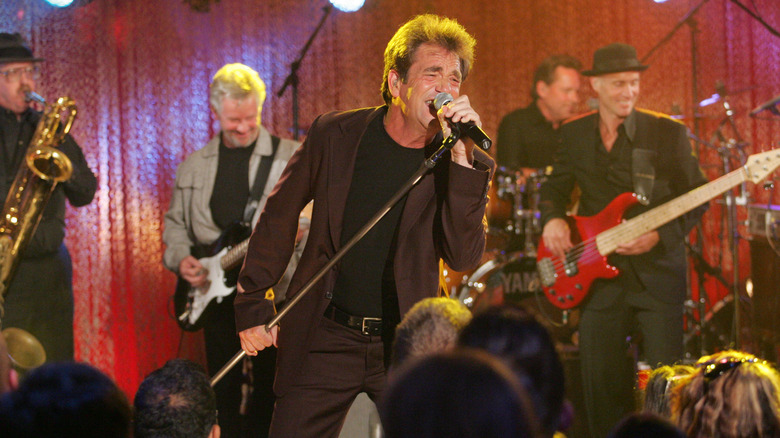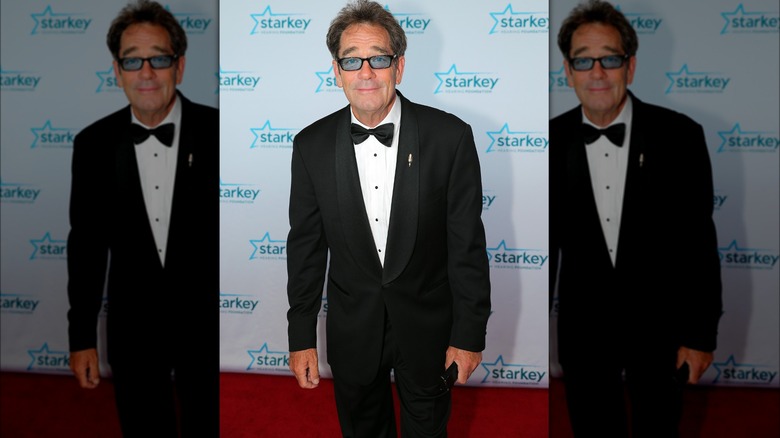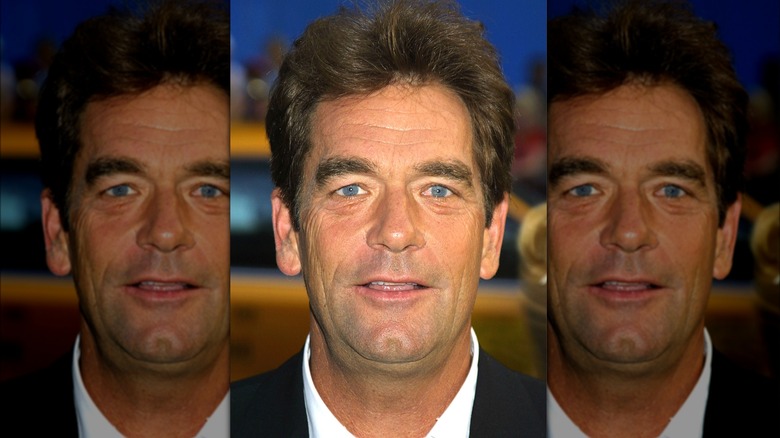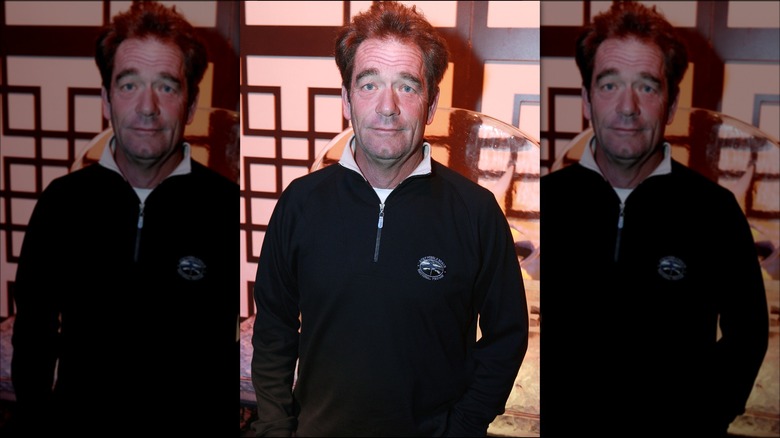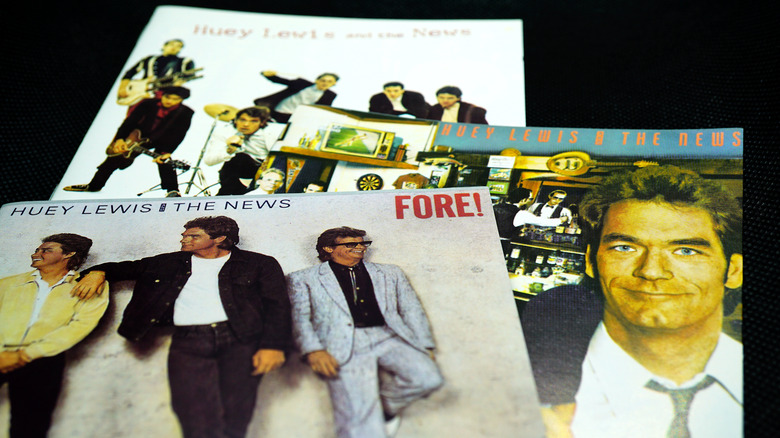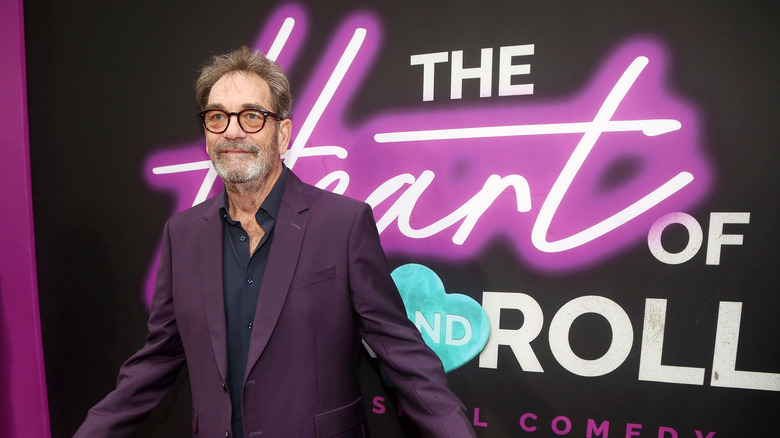Tragic Details About Huey Lewis' Life
The following article mentions mental health issues.
Hugh Anthony Cregg III, better known to the world as Huey Lewis of Huey Lewis and the News, ruled the airwaves in the '80s. His guy-next-door good looks, coupled with a seemingly affable personality, made him a standout among the hair bands and new wave artists of the decade. He rode the pop wave with mega hits like the catchy "I Want A New Drug" and "Heart and Soul," but it was "The Power of Love" that propelled him to superstar status. After all, that song was arguably the crown jewel of the soundtrack to the blockbuster hit flick "Back To the Future." Lewis' husky vocals took the song to the top of the Billboard charts, and it earned the singer an Oscar nod along the way for Best Original Song.
Lewis was not a celebrity who made news with stories of drugs, alcohol, or women left in his wake, but that doesn't mean that the singer led a charmed life. On the contrary, he has had many struggles throughout the years, including a failed marriage, lawsuits, a few flops, and an illness that put an end to his live performances once and for all. The artist will lift the curtain on his story in the mockumentary "Whatever Happened to Huey Lewis," currently in production for Fox. In the meantime, here's a look at a few of the tragic events that shaped the heart and soul of the iconic singer.
His parents divorce led to a battle for Huey Lewis' education
Born in New York City, but raised in Marin County, California, Huey Lewis' parents were, as he described to journalist Jill Kramer, "bohemians." According to Lewis, his father was an amateur jazz drummer who expressed himself better through music than words. "My father never said I love you, even though I know he loved me," he said in an interview with Big Issue. "He just didn't do that." As for his Polish-born mother, Lewis told Big Issue that she was "wild," and she embraced the California beatnik lifestyle, drugs and all. "She was probably, if not the first hippie in San Francisco, one of the very first hippies," he said.
His parents' lifestyle wasn't conducive to a strong marriage, and they ultimately called it off when Lewis was a pre-teen. However, they continued to battle in court over their young son's education. Lewis' father wanted him to go to prep school in New Jersey, while his mother wanted him to stay put. "It was kind of an ugly scene," Lewis told Kramer. "The judge finally asked me if I really wanted to go and I said, yeah." With that, he went to school on the East Coast. He later admitted that he based his decision primarily on a photo of a girl in the school's catalog, but whom he never saw on campus.
A gap year abroad taught Huey Lewis some hard life lessons
Following his buttoned-up East Coast prep school education, Huey Lewis was accepted to Cornell University and was ready to continue his education. Once again, his father intervened, but this time in a decidedly non-traditional way. He encouraged his son not to go to college, but rather to take some time off and go to Europe. "I'd been to an aggressive prep school and he felt that education occurs at the high school level so that was all I needed," the singer said in an interview with Big Issue.
Lewis grew his hair, packed his harmonica (a gift from his mother), and spent a year bumming around Europe and North Africa. It wasn't all fun and games, however. Lewis ran into some troubles when, while hitchhiking through Spain, his long-haired hippie look deterred many locals from picking him up. He would often sit on the side of the road for hours in hopes of getting a ride. A potentially more dangerous situation ensued when Lewis lost his passport while returning from Morocco. Not only was the American embassy closed for the weekend, Lewis was short of cash. "I've got 15 bucks to my name, and I know it costs $15 for a duplicate passport," he told journalist Jill Kramer in 2001. To resolve the problem, Lewis turned to music, playing his harmonica in a makeshift concert to earn the cash he needed to get home.
Huey Lewis' marriage ended after six years
With his good looks, fame, and talent, you might think Huey Lewis would have had a string of supermodels on his arm, à la high-profile serial dater Leonardo DiCaprio. But in the '80s, the hunky harmonica player seemingly had eyes for just one woman, model and actor Sidney Conroy. In 1983, Lewis married the beautiful brunette in Hawaii, and went on to have two children, Austin Cregg and Kelly Cregg. It seemed that the power of love wasn't strong enough to sustain the union; while Lewis may have originally been happy to be stuck with Conroy, their marriage ended in divorce after just six years. No, it was not the shortest celebrity marriage by any stretch, but it certainly didn't go the distance.
Lewis never remarried and has kept his love life on the down low. He has reportedly remained friendly with his ex and is close with his now grown children.
With his own upbringing fraught with disconnect and lack of verbal affirmation from his father, Lewis has said that he has made a point to be better with his children. In his aforementioned interview with Big Issue, he shared that he and his kids say "I love you" all of the time, and he described his son as his "best friend." "He has turned into this wonderful person who looks after his father," the singer said. "And I need some looking after. So I'm very pleased."
Huey Lewis accused Ray Parker Jr. of ripping off his song
Who you gonna' call? Your attorney! Having penned the smash "Power of Love" for the smash feature film "Back to the Future," Huey Lewis was no stranger to the Hollywood soundtrack scene. Yet, when he was tapped to write the theme for "Ghostbusters," the singer, who was at the top of his game, declined. Enter Ray Parker Jr. who was given the task of writing the theme in a mere three days.
Here's where things get messy. Allegedly, Lewis' top ten single "I Want A New Drug" was used as a placeholder in some of the movie scenes sent to Parker for inspiration. And as far as Lewis was concerned, Parker's song stuck too close to his own song. Lewis sued Parker and Columbia Pictures for copyright infringement, and they ultimately settled out of court. Per the agreement, Lewis was to never speak of it again. That should have been it — but wait, there's more.
In an episode of VH1's "Behind the Music," filmed more than a decade later, Lewis made a snarky comment about the "Ghostbusters" situation that sparked more drama. "I suppose it was for sale, because, basically, they bought it," he said of his sound. Parker pounced on his remarks as a violation of the confidentiality agreement, and sued Lewis. The results of that case have seemingly not been disclosed.
At the height of his fame Huey Lewis just said no to Coke
In the decade of "just say no" to drugs, Huey Lewis said "no" to Coke — as in the soft drink. During the cola wars, Pepsi and Coca-Cola were battling it out for consumer dollars, pulling out all the stops in an effort to top one another.
In 1983, Pepsi started making commercials featuring Michael Jackson. Not to be outdone, Coca-Cola turned to another big name pop star, Huey Lewis, reportedly offering him millions to seal the deal. "They told me I had the largest Q score of anybody in America," he shared in a Rolling Stone interview. "I didn't know what that meant, but they told me it was based on likability, recognizability, credibility and all that crap. They actually said to me, 'We think you have what we call 'Cokeness.'"
Likability or not, Lewis shot them down, a decision he later seemed to regret. "In retrospect, it was probably a mistake," he told the magazine. "It could have been good for the career — forget the money." At the time though, he told CNBC, it felt like being a sellout. "We had just started selling out concerts, making more money than we'd ever made. And I thought why would I do this for money? I'm an artist. I'm an artist, and an idiot."
Huey Lewis experienced hearing loss at the height of his career
A few years after Huey Lewis' career took off, he lost his hearing in his right ear. "I couldn't shake it out or pop my ears," he recalled to Rolling Stone. "I went to all kinds of doctors and an EMT finally said to me, 'Get used to it.' I said, 'Get used to it? I'm a musician!'"
Years later, he'd learn that the root of the problem turned out to be a condition known as Ménière's disease, which is an inner-ear disorder. "It's a syndrome based on symptoms," the singer told Rolling Stone. "If you have fullness in your ears, vertigo, and tinnitus, they call it Ménière's, but they don't know what it is."
He's not the only musician who has struggled with their hearing. Dave Grohl of Nirvana and Foo Fighters fame and Fleetwood Mac founding member Mick Fleetwood are just some of Lewis' fellow rockers who suffer from hearing loss. Because Lewis' hearing loss was limited to one ear, he adjusted and continued his career without interruption as best he could until 2018.
Huey Lewis struggled with depression after losing his hearing
As previously noted, Huey Lewis suffered hearing loss in his right ear in the '80s, but he was still able to keep performing for decades. In January 2018, however, his hearing in his left ear dropped during a small show in Dallas. A few months later, he took to X, formerly known as Twitter, to offer an update on how he was doing. "Although I can still hear a little, one-on-one, and on the phone, I can't hear music well enough to sing," he wrote. "The doctors believe I have Meniere's disease and have agreed that I can't perform until I improve."
Lewis tried everything to restore his hearing, ranging from meeting with world-renowned experts to trying alternative methods. However, nothing worked, and he unfortunately had to shut the door on his career as a performer. In his aforementioned interview with Whitefish Review, Lewis opened up about how hard it was to come to terms with the reality of his situation. Thankfully, with the help of family and friends, Lewis said he was able to work through this difficult period.
Things got a little psycho for Huey Lewis with Bret Easton Ellis movie
Two of Bret Easton Ellis' best-selling books, "Less Than Zero" and "American Psycho," went on to become iconic movies in their own right, but it was the latter that caused Huey Lewis to go a little psycho himself. In the book, the author spends quite a few words on Huey Lewis and the News, so when it came time to turn the book into a motion picture, the powers that be asked Lewis for permission to use his hit "Hip to Be Square." Lewis affably agreed to the song's use in the film, but he wasn't up for it being included on the soundtrack. As he told Rolling Stone, he wasn't interested in having his song on a record full of source music. "I said, 'Our fans have to buy this record for one song? Can we politely decline?'" he recalled.
The studio responded by releasing a statement about Lewis, claiming that he had a problem with the violent nature of the film and didn't want his music associated with it. Lewis told Rolling Stone that not only was not the case, but the studio's statement soured him on the flick. "So I boycotted the movie from there on. I refused to watch it," he said. In an interview with M Live, the singer elaborated. "That was just a made up story they used to gin up enthusiasm for the premiere, which was kind of Hollywood and below the belt."
Huey Lewis found himself on the hook in a fishing controversy
When he isn't writing catchy hooks, Huey Lewis is baiting them. An avid fly fisherman, he has spent much of the past three decades at his home in Missoula, Montana, fishing the waters, and fighting for the right to keep others from doing the same on his property. According to Lewis, he purchased property with an irrigation ditch that he claimed was exempt from Montana's Stream Access Law, which permits public access fishing in Montana waters. Lewis claimed he was targeted by locals because of his celebrity status. "It became cause celeb to go after these 'rich guys,'" Lewis told Whitefish Review in 2019. "They painted this picture of us coming in, buying property with public water, and fencing the public off from the water. Which was a lie."
Lewis spent the better part of 20 years defending his property, and although both the Conservation District and the District Court agreed that the so-called stream was in fact a ditch, the State Supreme Court disagreed and Lewis had to open the waters to the public. "And now the resource has been decimated," the singer told the magazine. "It's like 10 percent of the fishery it used to be." He added that the ruling was a loss for everyone involved. "The policies from on high are too access oriented. They don't consider the resource enough. Policy should start with the resource."
Perhaps to supplement his income Huey Lewis sold his music catalog
Huey Lewis never quite found the same level of fame with his later albums that he did in his early days, but he still earned a nice living from touring and playing live gigs. When his sudden hearing loss forced Lewis to cancel his live performances, one can assume it put a sizable dent in his income. Perhaps that's why he sold the entire Huey Lewis and the News music catalog through 1994 to Primary Wave for a reported whopping $20 million. The deal includes the band's most familiar and best-selling hits from the height of their fame.
Primary Wave Music's David Weitzman expressed his excitement about the acquisition of the iconic band's body of work in Variety. "Their incredibly crafted songs still made me smile, remind me of that seemingly more innocent era, and make me want to sing along at the top of your lungs. Primary Wave look forward to working with Huey to create new opportunities for his storied song catalog into the future."John Luneau, Primary Wave Music's Senior Counsel, echoed the sentiment. "Our entire team is looking forward to working with them to generate new and exciting opportunities for their iconic catalog."
Lewis, of course, isn't the first artist to sell his catalog, and he certainly made a good chunk of change from this deal. However, parting ways with his body of work presumably must've been bittersweet to some degree. After all, as Madonna once said in Variety, "Ownership is everything isn't it?"
His Broadway musical The Heart of Rock and Roll stopped beating
His days of performing may have been taken from him too soon, but Huey Lewis found what he called "salvation" in the bright lights of Broadway with his musical "The Heart of Rock and Roll." "Well, we're very excited. We've been working on it for a long time," the singer-songwriter told People. "I lost my hearing seven years ago, so I can't sing or perform, but I can do this. And boy, it's been a salvation for me personally, and it's really been gratifying." The show featured Huey Lewis and the News' biggest hits, but "The Heart of Rock and Roll" didn't beat long. With only so-so reviews and no coveted Tony nods, It grossed less than $300 thousand and was shut down after just 24 previews and 72 performances.
The Grammy-winning singer got teary during his remarks following the final performance, where he thanked everyone involved and expressed his sadness over the show's early end. "I have thought about this show every day, almost constantly ... for almost 8 months now. And tomorrow, that's going to stop. And that's a very sad thing for me," he said per People. Lewis went on to share his love of the stage, and to praise the cast for their performances. In his closing remarks, he added, "I'm not going to say goodbye, Broadway. I'm just going to say like we say in musical theatre: 'til we meet next time."
If you or someone you know is struggling or in crisis, help is available. Call or text 988 or chat 988lifeline.org
